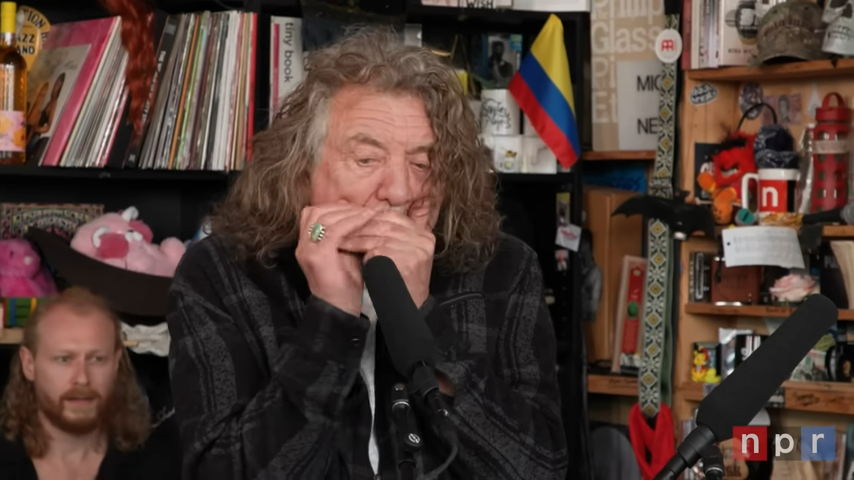While most rock legends coast on nostalgia, Plant’s recent NPR Tiny Desk performance proves artistic curiosity still drives his creative engine. The 76-year-old vocalist delivered a five-song set with Saving Grace that culminated in a stripped-down “Gallows Pole”—and somehow made the folk standard feel both ancient and urgent.
From Stadium Thunder to Office Whispers
The intimate NPR setting transforms Plant’s voice into something more conversational yet equally commanding.
Plant and his five-piece ensemble crammed into NPR’s book-lined studio space, trading Led Zeppelin’s bombast for acoustic arrangements that let every word breathe. Four tracks from Saving Grace’s debut album preceded the main event: at the 23-minute mark, those familiar opening notes of “Gallows Pole” emerged through Matt Worley’s delicate banjo work.
No Marshall stacks. No Robert Ludwig mastering magic. Just voices, strings, and that unmistakable Plant delivery cutting through dead air. The performance proved intimate venues reveal more about an artist’s true range than any stadium spectacle.
Honoring the Source Material
Plant’s acknowledgment of Lead Belly reveals the deep roots beneath Zeppelin’s heavy rock facade.
The performance highlighted what Plant has long emphasized: “Gallows Pole” belonged to Black American folk tradition long before Led Zeppelin III made it famous. Plant credits Lead Belly with introducing him to the song, a connection that transforms Zeppelin’s 1970 electric interpretation into cultural dialogue rather than appropriation.
Saving Grace’s version strips away the mystique, revealing the stark narrative about justice and desperation that made the song endure across centuries. You can hear every word clearly—something the original’s power chords sometimes obscured.
Ensemble Chemistry Over Star Power
Collective interplay proves this isn’t Plant’s backing group but genuine collaboration.
Watch Suzi Dian’s accordion work during “Higher Rock” or notice how Tony Kelsey and Barney Morse-Brown’s guitar-cello conversations develop—Saving Grace functions as true partnership. Plant shares vocal duties naturally, letting ensemble voices carry emotional weight rather than dominating every moment.
This collaborative approach creates something Netflix’s algorithm-driven content can’t: authentic human connection. Each musician contributes essential elements rather than simply supporting Plant’s lead.
More Songs in the Trunk
Plant hints at extensive unreleased material as Saving Grace continues touring through December.
“It’s not finished. There’s loads more,” Plant revealed recently, describing unreleased songs spilling from his car trunk like some roots music treasure chest. With UK dates scheduled through December, Saving Grace represents more than nostalgic detour—it’s Plant’s ongoing investigation into American musical DNA.
The Tiny Desk performance captures that restless creativity perfectly: respectful of tradition, unafraid of reinvention, and proof that authenticity still cuts deeper than volume.


























